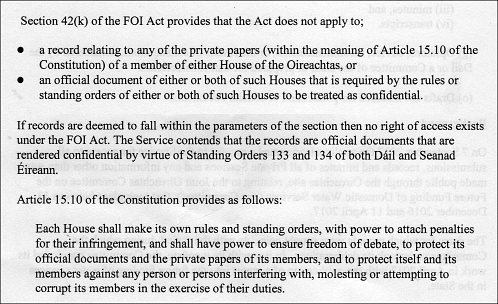The political class know exactly what it’s about. The majority of Irish citizens haven’t a clue. The result could be that total control over our water will be handed over to Brussels bureaucrats. It all hinges on a little subsection of a European Directive and the willingness of our government to use it. The question is who's going to champion the Irish cause?
by James Quigley
The subsection is 9.4 of the Water Framework Directive 2000 (WFD). This simply says member states shall not be in breach of the directive if they decide not to apply full provisions for a given water-use and they shall report the reasons in their River Basin Management Plans (RBMP).
This might not sound much but in reality it is massive. It allows member states to regulate it’s water according to established practices, as long as it does not ″compromise the purposes and the achievement of the objectives of the Directive″. Brussels can not remove this clause but Ireland can give it away and everything is pointing in that direction.
Each member country of the EU is obliged by the WFD to implement three River Basin Management Plans for structuring it’s water resources. By the end of the third, supposedly 2027, all members states should be in full compliance. Ireland, however, is three years late with their second RBMP with it’s draft plan just put up on the DHPLG website. It is open for submissions until February 28th.
According to a department information officer Ireland’s finalised plan will be published on April 2018, the same day that it is sent to the EU Commission. It will then be subject to 3 month’s of negotiations where the Irish Government must supply all supporting documentation. However there is speculation that these negotiations could run on much longer and then they could be affected by further rumours of a total revamp of the Water Framework Directive itself later on this year.
Should the unsuspecting public be wary?
The following is an extract of the draft River Basin Management Plan, page 20. I look upon the explanation of the 2010 plan wrong. It is a subjective one that suits their purpose but it does not give the full facts. Bear in mind that because they say something, it does not necessarily means it is fact. You might see what they are trying to do when you read the second part of the paragraph i.e. our ‘established practice’ is gone, full steam ahead.
″The first cycle of river basin management plans was completed in 2010. Ireland signaled an intention to introduce water charges and did not avail of the exemption outlined in article 9(4) of the WFD. In line with article 9(2) of the WFD, we will be required in the final river basin management plan for 2018- 2021 to set out our approach for the cost recovery of water services based on the economic analysis conducted according to Annex III, the contribution of the different water users to cost recovery and how this will contribute to achieving the environmental objectives of the Directive.″
Coupled with some fine print in the revised Water Services Act 2017, particular Section 9, that allows for CER (energy regulator) to do some fine adjustments to figures on ‘threshold amounts’ of domestic water, the Irish Public should be worried. That’s a nice way of saying; whittling away at the water basic allowances.
What can we do?
I like the idea of people arming themselves with facts, questioning everything and not listening to what they are told by politicians and media alike, no matter who they are. I also like the idea of public empowerment, helping themselves, but unfortunately the issue of water charges has been given over to the political establishment where it is now subject to legal interpretations.
The public must demand that politicians and groups who made commitments against water charges, whether it is Right2Water or Fianna Fáil, put their money where their mouths are. They have to question the legality of this draft River Basin Management Plan. If their integrity can be respected they must not accept what seems to be happening to the principle of Ireland's ‘Established Practice’. They must stand up to EU interference and threats.
Fianna Fáil has a particular responsibility in this issue since they are in a position of power because of it’s ″Confidence and Supply″ arrangement with the present Government.
The public should contact all TDs, even attend their constituency clinics and demand that they do everything in their power to protect Ireland’s ‘Established Practice’, They must question the published draft RBMP and at least make sure that the 9.4 section of the Water Framework Directive is invoked.




